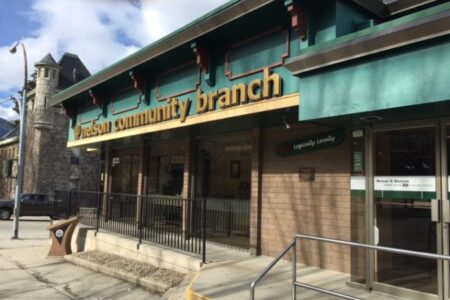Tax exemption bylaw passes, but controversies linger
This past Wednesday, October 27th at noon during a special meeting of council, Rossland officially adopted its new revitalization tax exemption bylaw. At its core, the intent of the bylaw is to remove one hindrance building owners face in fixing up or expanding their non-residential buildings in the hopes that it will attract new investment both from within and from away in the Golden City. That core purpose was generally agreed to by council.
Two councillors have opposed the bylaw however; not for the intent of the revitalization tax exemption but rather over two projects and whether or not they should or should not have been included.
The two projects in question are the Red Resort Lodge expansion and work done over the past year on the old Bank of Montreal building. These two projects began and have neared completion prior to the revitalization tax exemption bylaw coming in to place. In light of this fact, Councillors Laurie Charlton and Andy Stradling don’t believe an incentive program should reward projects that had already taken place.
“I remain opposed to the inclusion of these two exemptions on the basis that they are handouts at the expense of Rossland taxpayers,” explained Stradling via e-mail. “The revitalization bylaw was not in place, nor even proposed when these two developments proceeded. The bylaw is an incentive for developers to help revitalize our city and should only apply to those developments that proceed after it comes into law. I cannot agree to depriving the city of revenues that would be due in 2011, by making exemptions retroactively.”
Mayor Greg Granstrom doesn’t see it that way, and asked the Telegraph for an opportunity to rebut Councillor Charlton’s letter. He’s not concerned about the two existing projects being included.
“The big thing that we want to get out there is that Red Mountain is still going to be paying the same amount of tax at least as they paid before. If there were market changes that caused their assessment to go up than they will pay that. “
“This bylaw takes effect for the tax year, which is 2011. Right? The taxes you pay in 2011 are based on the assessment from October 31st 2009 to October 31 2010. Anything that fell from that time from the start to the finish would fit in this bylaw. So those two properties are eligible under this bylaw. They were applied for before October 31st and that is the deadline. That’s the deadline for the assessment. If you fall within that assessment period that’s all anybody needs to know. If it falls within the assessment period, it’s good for this year.”
On whether or not he believes incentive programs should be applied retroactively to pre-existing projects, Granstrom replied, “That’s a question that has many many answers. The answer I have to give to that as council’s representative is that this council encourages investment in our community. We have recognized that the economy is flat and we have to do what we can to encourage investment and this is for the year 09 – 10 tax period and what falls in there fits the bylaw.”
What has raised the eyebrows of Stradling and Charlton is that the applications from the two projects in question came in to City Hall in mid-September. The bylaw itself wasn’t finalized and adopted until October 27th. This has caused Councilor Charlton to ask, “How can somebody apply for a bylaw and a program that doesn’t yet exist?”
To this question the Mayor noted that “smart business people” saw this opportunity coming and wanted their applications in early in case the bylaw did go through.
“I would think they would put an application in because this has been on the go for so long that they know they want to be in there if this bylaw does pass.”
Another significant principle that both Charlton and Stradling have been trumpeting at recent council meetings is that they believe incentives are designed to spur new growth and development rather than as they saw it “rewarding” projects that had already been completed and would have happened with or without the tax exemption bylaw.
“Quite simply, we shouldn’t be giving breaks to incentify new developments to developments that have already taken place. They didn’t need the incentive to do the project and would have completed it anyway. If we’re going to go retroactive, how far back do we go? Folks like the Allan buildings on Columbia Avenue have put lots of manpower and money into their projects: should we retroactively incentify them as well?”
While the two councilors opposed to the bylaw believe the process could have been cleaner to start fresh in the next building period with the bylaw to avoid perhaps adding in projects that are already in progress, the mayor explained that the bylaw “has to start somewhere, so we decided this is where it will start. Where we chose to start it was for any projects that took place between November 1st 2009 and October 31st 2010.
While not all councilors agree with the exact approach taken on this bylaw, most councillors and staff expect the move will benefit Rossland over the longer term.
Granstrom believes that, while not everyone on council may fully agree with the decision, there comes a point when council should speak with one voice and not have individual members “attacking and criticizing with no basis” the bylaw’s intent–which is to improve the city.
“When people like Laurie make statements like “Do they have the community interests in mind?” Well, of course we do. What do you think we have in mind? What’s our motivation? Is Red Mountain giving us a free ski pass? I don’t think so. If you want to work for the community and you don’t understand that some economic activity is important, then what are you doing here? At some point you’ve just got to be confident in what you’re doing leave it at that and move forward with things.”
With the bylaw now adopted, non-residential development projects within Rossland city limits that are over $10,000 in value will be able to apply for a tax exemption on any increased assessment related to the new work, upgrades and improvements associated with the project.
That tax exemption will apply for approved projects for a five year period. At that time the developer may apply for a five year extension in which the tax on the increased assessment due to the improvements will be ramped back up over the second five year period. Part of the thought behind the bylaw is that currently developers who wish to improve their buildings are likely hit with an increased assessment on the value of their property and thus likely have to pay an increased property tax bill. Removing that hindrance to development and allowing a ramp up period for the project to start generating revenue before its hit with increased taxes is the basis of the new bylaw. At its heart, it’s as much removing a hindrance to development as it is creating an incentive for new development.
Projects that take place within a given tax year from November 1st to October 31st of each year can apply prior to October 31st in the year the project took place. When assessments begin taking place on November 1st the applied property receives their exemption and the new work is not factored in to the assessed value to be taxed on.
Ultimately, the new bylaw was passed on Wednesday the 27th by council and the two projects in question have been accepted under the program. Moving forward,, it is hoped that the new bylaw will spur investment in the community, remove one hindrance to development in Rossland and, at the end of the day, leave our city both improved and in better economic health by the end of the five, possibly ten, year program. In the short, term the City will not lose any revenue : instead, it will simply not gain new revenue from these projects through increased assessments. Once the exemption expires, the city will receive increased revenues from these projects based on any increases in their assessments at that time.
The question still lingers however; is it right to offer incentives to develop to projects that have already been completed?
























